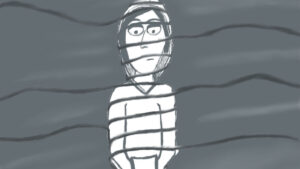Insidiousness of Emotional Abuse
 Emotional abuse is insidious because it leaves no marks. Not on the outside of the body anyway. The damage done was always on the inside. This leaves the abuser in a place of power for much longer to continue manipulating the victim. At least, that was my experience.
Emotional abuse is insidious because it leaves no marks. Not on the outside of the body anyway. The damage done was always on the inside. This leaves the abuser in a place of power for much longer to continue manipulating the victim. At least, that was my experience.
Evidence? What?
No evidence. No crime. Good luck getting anyone to hear my story and act.
Emotional abuse is a pattern of behavior in which the perpetrator insults, humiliates, and generally instills fear in an individual to control them. The individual’s reality may become distorted as they internalize the abuse as their own failings.
Wrapped in Darkness
Sinewy tendrils
twine around the mind
and heart.
Throttling any goodness,
any light that
could dispel the dark
threatening to snuff
joy, happiness,
anything that
may elevate the
escape of those
whose lives are necessary
to displace feelings of
hatred, that a self
feels, but can’t
acknowledge.
That dark anger
fuels the lashes
at the spurned child, caught
in a web of unknowns.
Looking for love,
the unconditional kind,
and finding nothing,
except regret, anger,
hatred of a parent for
that child.
Look harder? You will
only find blame, humiliation,
and terror in a place that should
be filled with love. But
there was none to find.
Not here, there,
not anywhere.
The nowhere child searches
further for the elusivity of
love.
Conflict of Emotional Abuse
Emotional abuse is such a conflicting situation. It’s a thing that starts outside of yourself that, over time, wears down a sense of self, which becomes a sense of what others think. Then what others think becomes incorporated into what I thought of myself.
The conflict that comes with emotional abuse is that I knew what my parents told me and others about me weren’t true. But the daily barrage of abuse reinforcing their narrative became too much. And it always will become too much. I don’t care who you are or how strong your sense of self is; emotional abuse will wear you down.
There is Another Me
If it hadn’t been for my interactions with others, friends, parents, teachers, etc., who gave me an opposing view of myself, I wouldn’t be here. Everything my mother told me I was, they would tell me I was not.
They didn’t know (or they chose not to see – I think some of my teachers had their suspicions) what was happening; they told me kind things, as any teacher, adult, or friend would say. It was their words that resonated with me. Like something inside me knew that was the truth and what my parents told me at home was all lies.
Therapy helped me rediscover my love of writing. It took me years of healing to get to where I am today. If you are struggling with anything, give therapy a try.
I recommend Online-Therapy.* Encouraging therapy is their first step in healing.

Check out some of my other writings about alcoholism and sobriety. “The Slow Descent to Sobriety” starts my December series about addiction and my journey with sobriety. You can also check out my recent poetry, What Happened to All of My Words??
* I receive compensation from Online-Therapy when you use my referral link. I only recommend products and services when I believe in them.
Daily Superheroism.com (dba Talia Fletcher LLC) is also a participant in the Amazon Services LLC Associates Program, an affiliate advertising program designed to provide a means for sites to earn advertising fees by advertising and linking to Amazon.com.
Please note that I have not received any free products, services, or anything else by these companies in exchange for mentioning them on the site. The only consideration is in the form of affiliate commissions.

0 Comments